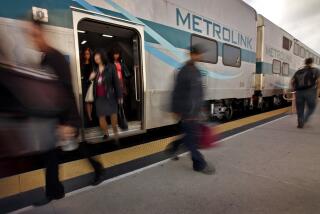Train’s engineer received, sent text messages on duty
- Share via
Federal investigators said Wednesday that records from Metrolink engineer Robert M. Sanchez’s cellphone show that he sent and received text messages while on duty Friday, the day he was involved in a catastrophic train collision in Chatsworth.
However, investigators have not yet analyzed the records to determine whether Sanchez was using his phone at the time his train slammed into an oncoming Union Pacific freight train in an accident that left 25 people dead and 135 others injured.
“The safety board will correlate those records with other investigative information to determine as precisely as possible the exact times of those messages in relation to the engineer’s operation of his train,” a spokesman for the National Transportation Safety Board said in a written statement.
The agency subpoenaed the phone records after hearing news reports that several youths said they had exchanged text messages with Sanchez shortly before the crash.
Federal investigators did not say how many text messages Sanchez sent and received.
The NTSB disclosure came on the eve of a California Public Utilities Commission meeting today at which officials are expected to ban personal use of wireless devices by train workers. The move, a response to Friday’s crash, is intended to quickly correct a troubling omission in federal railroad regulations, according to a PUC report obtained Wednesday.
In addition to the Chatsworth crash, which the report says may have been partially caused by cellphone use, inappropriate phone usage may have resulted in a collision between two San Francisco commuter trains in June. Swift action is needed because of the “imminent danger” of mobile phone use by rail workers, the report says.
Also on Wednesday, Los Angeles Mayor Antonio Villaraigosa replaced one voting member and one alternate member of the Metrolink board of directors, saying he wanted to ensure that safety and agency transparency are top priorities.
The move was not a rebuke of the board members who were replaced, but was intended to send a clear message to the 11-member Metrolink board that it was a mistake to “assume a defensive posture” in its response to the tragedy, said a source familiar with the mayor’s decision who spoke on the condition of anonymity.
He was referring to actions taken against Metrolink’s chief spokeswoman, Denise Tyrrell.
She resigned Monday after being criticized by her superiors, who said she had spoken prematurely when she told the media that Sanchez had caused the crash.Villaraigosa has the authority to make the changes because he also serves as chairman of board of the Metropolitan Transportation Authority, one of the agencies that appoints Metrolink board members to oversee the five-county commuter rail line.
“The mayor believes that the public deserves answers and the agency needs changes, and he’s taking the leadership to get it done,” said Villaraigosa spokesman Matt Szabo.
“The operational safety of Metrolink must be the paramount concern.”
Effective immediately, Villaraigosa appointed MTA board member Richard Katz, a longtime transportation advisor to the mayor, as a voting member of the Metrolink board and Deputy Mayor Jaime de la Vega as an alternate.
They replace current board member Anthony J. Bejarano and alternate Francine Oschin.
In an interview, Katz said that he and Villaraigosa would introduce a motion at the MTA board meeting today to study all systems that may be used to prevent collisions, including the positive train control safety system that NTSB investigators say could have prevented the Chatsworth crash.
“We want to make sure that we have every safety tool in the toolbox working on these lines, particularly when you have freight and commuter sharing the lines,” Katz said.
Although he’s not certain that a full, comprehensive train control system will be ready any time soon, Katz said there may be other safety measures that can be taken on an interim basis.
For example, Katz said some freight cars are equipped with couplers that help prevent one car from crushing another.
As for cost, Katz said, “I think between the five counties [that finance Metrolink] we’ll find a way to pay for it.”
When Metrolink directors met publicly Wednesday to discuss the crash, Chief Executive David R. Solow was asked if media reports were true that he had concerns about the cost of implementing an automated system that would stop a train in an emergency.
“They are testing some [systems] right now, and we are waiting for the results of those tests,” Solow said.
“Cost has not been an issue. We are waiting for technology that works.”
As the investigation continued, friends and relatives of passengers killed in the accident began to formally say goodbye to their loved ones.
The first memorial service was for Howard Pompel, 69, a married father of three who was on his way home to Simi Valley when the trains collided.
A service will be held today for Los Angeles Police Department Officer Spree Desha, 35, at the Cathedral of Our Lady of the Angels in downtown. Desha, a resident of Simi Valley, was also heading home from work.
--
Times staff writer Phil Willon contributed to this report.
More to Read
Sign up for Essential California
The most important California stories and recommendations in your inbox every morning.
You may occasionally receive promotional content from the Los Angeles Times.











